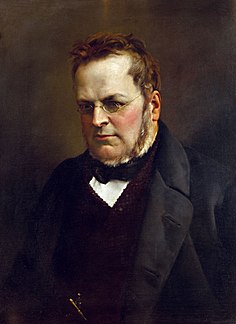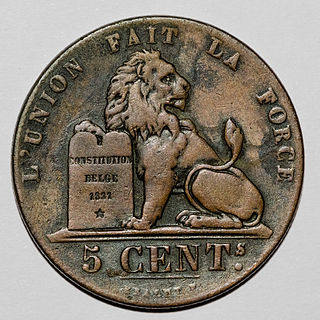
The Orléanists were a French political faction supporting a constitutional monarchy for France led by the House of Orléans as opposed to Legitimists who supported the main line of the House of Bourbon. The Orléanist faction governed France from 1830 to 1848 in the July Monarchy of King Louis Philippe I. The faction took its name from the Orléans branch of the House of Bourbon. The faction comprised many liberals and intellectuals who wanted to restore the monarchy as a constitutional monarchy with limited powers for the king and most power in the hands of parliament.

General elections were held in the Netherlands on 3 July 1918. They were the first elections held after a series of reforms that introduced universal male suffrage and pure proportional representation, replacing the previous system using first-past-the-post voting in single member constituencies. This change was known as the Great Pacification, which also included the introduction of state financing of religious schools, and led to the start of consociational democracy.

Bulgaria elects on national level a head of state - the president - and a legislature. The president is elected for a five-year term directly by the people. The National Assembly has 240 members, elected for a four-year term by proportional representation in multi-seat constituencies with a 4% threshold. Bulgaria has a multi-party system, in which no one party often has a chance of gaining power alone, and parties must work with each to form governments.

Federal elections were held in Germany on 19 January 1919, although members of the standing army in the east voted for their representatives only on 2 February. The elections were the first of the new Weimar Republic following World War I and the Revolution of 1918–19. It was also the first German election held using proportional representation and with women's suffrage. It is also reckoned as the first truly free and fair all-German election, as it was the first to be held after the scrapping of the old constituencies that over-represented rural areas. The voting age was lowered to 20, down from 25 which it had been in the Reichstag election of 1912.

Constituent Assembly elections were held in Bulgaria between 1 and 30 January 1879, although only 117 of the 231 members of the Assembly were elected during this period. It followed the country's liberation from the Ottoman Empire, and saw the Conservative Party and the Liberal Party emerge as the two main parties. The Assembly was opened on 10 February, and convened in Veliko Tarnovo to ratify the country's first constitution, known as the Tarnovo Constitution, on 16 April. The parliament was later transferred to Sofia, which became the capital of the country.

Constitutional Assembly elections were held in Bulgaria on 27 October 1946. The elections served to elect members to the 6th Grand National Assembly, tasked with adopting a new constitution. The Fatherland Front, an anti-fascist coalition dominated by the Bulgarian Communist Party, had come to power in 1944 following a coup. Now that the Second World War was over and the monarchy abolished the communists wanted to adopt a new constitution. The Communists won a large majority, with 53.5 percent of the vote and 278 of the 465 seats. Voter turnout was 92.6%. This would be the lowest vote share that the Communists or the Fatherland Front would claim during the 43 years of undisguised Communist rule in Bulgaria. In subsequent years, the Fatherland Front would claim to win elections with unanimous or near-unanimous support.

General elections were held in Liechtenstein on 1 February 1970. The Patriotic Union won 8 of the 15 seats in the Landtag, the first time it had held a majority since its formation in 1936. However, it continued the coalition government with the Progressive Citizens' Party, which had been in power since 1938. Voter turnout was 94.8%, although only male citizens were allowed to vote.

Constituent Assembly elections were held in Austria on 16 February 1919. The result was a victory for the Social Democratic Workers' Party, which won 72 of the 170 seats. The party was largely supported by the working class, whilst farmers and the middle class voted mainly for the anti-Anschluss Christian Social Party. Voter turnout was 84.4%. It is generally reckoned as the first free election ever held in Austria.

Parliamentary elections were held for the first time the Austrian section of the Habsburg Monarchy in June 1848. This group of territories would in Austria-Hungary be referred to as Cisleithania. This happened after the Revolutions of 1848 in the Habsburg areas caused the Klemens von Metternich government to fall. The election followed the imposition of a new constitution on 25 April by Ferdinand I. The new Imperial Council first met in Vienna on 22 July, but was then relocated to Kremsier in Moravia due to fighting, after which it became known as the Kremsier Parliament.

Full general elections were held in Belgium on 14 October 1894, with run-off elections held on 21 October 1894.

Full general elections were held in Belgium on 2 June 1912.

Partial general elections were held in Belgium on 8 June 1847. The result was a victory for the new Liberal Association, which had been formed the previous year. It won 33 seats to the Catholics' 21, as the latter were split into dogmatic and liberal groups. Voter turnout was 77%, although only 1% of the country's population was eligible to vote.

Full general elections were held in Belgium on 13 June 1848. They followed an equalisation of the tax qualifications for voters, which widened the franchise from 1.0% of the population to 1.8%. Unlike the previous rules which had favoured Conservatives and Catholics, this benefitted the Liberal Party and damaged the Catholics, who lost more than half their seats.
Elections for the Constituent Assembly were held in Denmark on 5 October 1848. Of the 158 seats in the Assembly, 114 were elected and 44 appointed by the King. An additional 31 candidates were to come from the Duchy of Schleswig but were not elected due to the First Schleswig War.
Parliamentary elections were held in Greece on 16 December 1843. The elected body was also tasked with drawing up a constitution, following the 3 September 1843 Revolution. The Three-Party Coalition won almost half the seats in the 243-seat Chamber.
Parliamentary elections were held in Greece between June and August 1844. Supporters of Andreas Metaxas emerged as the largest block in Parliament. However, Ioannis Kolettis became Prime Minister on 18 August.

General elections were held in Italy on 27 January 1861, with a second round on 3 February. The newly elected Parliament first convened in Turin on 4 March 1861, where, thirteen days later, it declared the unification of the country as the Kingdom of Italy.
Folketing elections were held in Denmark on 12 October 1866, following the introduction of a new constitution. The National Liberal Party and the National Left emerged as the largest factions, winning 20 seats each. Christian Emil Krag-Juel-Vind-Frijs remained Prime Minister.

The Progressive Liberal Party was a political party in Bulgaria.
The People's Party was a political party in Bulgaria between 1894 and 1920.














